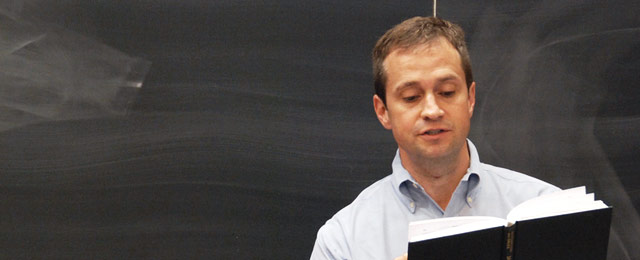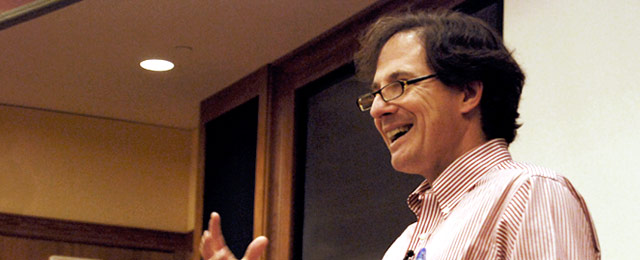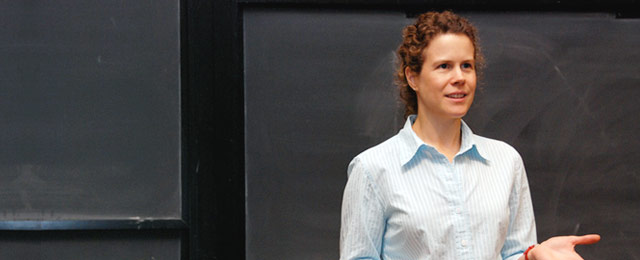Online courses directory (217)
It is easy to think of love as a "universal language" - but do ideas about love translate easily across history, culture, and identity? In this course, we will encounter some surprising, even disturbing ideas about love and sex from medieval writers and characters: For instance, that married people can never be in love, that the most satisfying romantic love incorporates pain and violence, and that intense erotic pleasure can be found in celibate service to God. Through Arthurian romances, Chaucer's Canterbury Tales, love letters, mystical visions, and more, we will explore medieval attitudes toward marriage, sexuality, and gender roles. What can these perspectives teach us about the uniqueness of the Middle Ages—and how do medieval ideas about love continue to influence the beliefs and fantasies of our own culture?
This survey provides a general introduction to medieval European literature (from Late Antiquity to the Fifteenth Century) from the perspective of women writers from a variety of cultures, social backgrounds, and historical timeperiods. Though much of the class will be devoted to exploring the evolution of a new literary tradition by and for women from its earliest emergence in the West, wider historical and cultural movements will also be addressed: the Fall of the Roman Empire, the growth of religious communities, the shift from orality to literacy, the culture of chivalry and courtly love, the emergence of scholasticism and universities, changes in devotional practices, the persecution of heretics, the rise of nationalism and class consciousness. Authors will include some of the most famous women of the period: Hildegard of Bingen, Heloise of Paris, Marie de France, Christine de Pizan, Joan of Arc, Margery Kempe, along with many interesting and intriguing though lesser known figures.
This class is a study of Milton's poetry, with attention paid to his literary sources, his contemporaries, his controversial prose, and his decisive influence on the course of English poetry. Throughout the course, Professor Rogers explores the advantages and limitations of a diverse range of interpretive techniques and theoretical concerns in Milton scholarship and criticism. Lectures include close readings of lyric and epic poetry, prose, and letters; biographical inquiries; examinations of historical and political contexts; and engagement with critical debates.
This course analyzes major modern plays featuring works by Shaw, Pirandello, Beckett, Brecht, Williams, Soyinka, Hwang, Churchill, Wilson, Frayn, Stoppard, Deveare Smith, and Kushner. The class particularly considers performance, sociopolitical and aesthetic contexts, and the role of theater in the world of modern multimedia.
Tradition and innovation in representative fiction of the early modern period. Recurring themes include the role of the artist in the modern period; the representation of psychological and sexual experience; and the virtues (and defects) of the aggressively experimental character. Works by Conrad, Kipling, Babel, Kafka, James, Lawrence, Mann, Ford Madox Ford, Joyce, Woolf, Faulkner, and Nabokov.
This course covers the body of modern poetry, its characteristic techniques, concerns, and major practitioners. The authors discussed range from Yeats, Eliot, and Pound, to Stevens, Moore, Bishop, and Frost with additional lectures on the poetry of World War One, Imagism, and the Harlem Renaissance. Diverse methods of literary criticism are employed, such as historical, biographical, and gender criticism.
This course considers some of the substantial early twentieth-century poetic voices in America. Authors vary, but may include Moore, Frost, Eliot, Stevens, and Pound.
We'll read the major poems by the most important poets in English in the 20th century, emphazinig especially the period between post-WWI disillusionment and early WW II internationalism (ca. 1918-1940). Our special focus this term will be how the concept of "the Image" evolved during this period. The War had undercut beliefs in master-narratives of nationalism and empire, and the language-systems that supported them (religious transcendence, rationalism and formalism). Retrieving energies from the Symbolist movements of the preceding century, early 20th century poets began to rethink how images carry information, and in what ways the visual, visionary, and verbal image can take the place of transcendent beliefs. New theories of linguistics and anthropology helped to advance this interest in the artistic/religious image. So did Freud. So did Charlie Chaplin films.
We'll read poems that pay attention both to this disillusionment and to the compensatory joyous attention to the image: to ideas of the poet-as-language-priest, aesthetic-experience-as-displaced-religious impulse, to poetry as faith, ritual, and form.
This course, the first installment of the multi-part Poetry in America series, covers American poetry in cultural context through the year 1700. The course begins with Puritan poets--some orthodox, some rebel spirits--who wrote and lived in early New England. Focusing on Anne Bradstreet, Edward Taylor, and Michael Wigglesworth, among others, we explore the interplay between mortal and immortal, Europe and wilderness, solitude and sociality in English North America.
Led by Harvard Professor Elisa New, Poetry in America surveys nearly 400 years of American poetry. Through video lectures, archival images and texts, expeditions to historic sites, interpretive seminars with large and small groups, interviews with poets and scholars, and conversations about poems with distinguished Americans, Poetry in America embarks on a journey through the literature of a nation. Distinguished guests, including President Bill Clinton, Elena Kagan, Henry Louis Gates, Eve Ensler, John McCain, Andrea Mitchell, Michael Pollan, Drew Faust, Tony Kushner, and Nas, among others, bring fresh perspectives to the study of American Poetry.
HarvardX pursues the science of learning. By registering as an online learner in an HX course, you will also participate in research about learning. Read our research statement to learn more.
This module, the third installment of the multi-part Poetry in America series, focuses on the poetry of Walt Whitman, a quintessentially American writer whose work continues to bear heavily upon the American poetic tradition. We will explore Whitman’s relationship to the City, the Self, and the Body through his life and poetry. Distinguished guests in this module include Tour de France champion Greg LeMond, Supreme Court Justice Elena Kagan, and Whitman scholar Karen Karbiener.
Led by Harvard Professor Elisa New, Poetry in America surveys nearly 400 years of American poetry. Through video lectures, archival images and texts, expeditions to historic sites, interpretive seminars with large and small groups, interviews with poets and scholars, and conversations about poems with distinguished Americans, Poetry in America embarks on a journey through the literature of a nation. Distinguished guests, including President Bill Clinton, Elena Kagan, Henry Louis Gates, Eve Ensler, John McCain, Andrea Mitchell, Michael Pollan, Drew Faust, Tony Kushner, and Nas, among others, bring fresh perspectives to the study of American Poetry.
HarvardX pursues the science of learning. By registering as an online learner in an HX course, you will also participate in research about learning. Read our research statement to learn more.
In this course, we will investigate popular culture and narrative by focusing on the relationship between literary texts and comics. Several questions shape the syllabus and provide a framework for approaching the course materials: How do familiar aspects of comics trace their origins to literary texts and broader cultural concerns? How have classic comics gone on to influence literary fiction? In what ways do contemporary graphic narratives bring a new kind of seriousness of purpose to comics, blurring what's left of the boundaries between the highbrow and the lowbrow? Readings and materials for the course range from the nineteenth century to the present, and include novels, short stories, essays, older and newer comics, and some older and newer films. Expectations include diligent reading, active participation, occasional discussion leading, and two papers.
When learning a new language an important first step is to learn the rules of grammar that allow people express what they want to say and understand what others are saying in a coherent manner. An equally important second step is to practise using the rules of grammar to become proficient in communicating in the language. In this free online English language course you will get to practise using important rules of grammar that will greatly improve your ability to communicate in both spoken and written English. You will practise the use of tenses such as the present continuous, past perfect, past simple, present perfect continuous and past perfect continuous to improve your ability to communicate. You will also practise and learn how to use superlatives and comparatives, and practise using reported speech. This free online English language course will be of great interest to all learners who have studied previous English language courses on ALISON such as 'Fundamentals of English Grammar' and 'Introduction to Conversational English', and who now want to further practise and improve their ability to communicate confidently in English.<br />
Great works of fiction often take us to far-off places; they sometimes conduct us on journeys toward a deeper understanding of what's right next door. We'll read, discuss, and interpret a range of short and short-ish works: The reading list will be chosen from among such texts as "Gilgamesh," Homer's Odyssey (excerpts), Bunyan's The Pilgrim's Progress (excerpts), Swift's Gulliver's Travels, Mary Shelley's Frankenstein, Conrad's Heart of Darkness, Saleh's Season of Migration to the North, Woolf's To the Lighthouse, John Cheever's "The Swimmer," Coetzee's The Life and Times of Michael K, Irving's "Rip Van Winkle," Toni Morrison's Jazz, H. G. Wells' The Time Machine, Twain's The Adventures of Huckleberry Finn, Beckett's How It Is, Calvino's Invisible Cities, Forster's A Passage to India. As a CI-H class, this subject will involve substantial practice in argumentative writing and oral communication.
"Reading Poetry" has several aims: primarily, to increase the ways you can become more engaged and curious readers of poetry; to increase your confidence as writers thinking about literary texts; and to provide you with the language for literary description. The course is not designed as a historical survey course but rather as an introductory approach to poetry from various directions – as public or private utterances; as arranged imaginative shapes; and as psychological worlds, for example. One perspective offered is that poetry offers intellectual, moral and linguistic pleasures as well as difficulties to our private lives as readers and to our public lives as writers. Expect to hear and read poems aloud and to memorize lines; the class format will be group discussion, occasional lecture.
Together with the Shakespeare Birthplace Trust, Professor Jonathan Bate explores Shakespeare, his works and the world he lived in.
Academics from the Shakespeare Institute introduce aspects of the most famous play ever written - its origins, texts, and history.
Shakespeare wrote for a popular audience and was immensely successful. Shakespeare is also rightly regarded as one of the greatest playwrights the world has known. This course will try to understand both Shakespeare’s popularity and his greatness by starting from a simple premise: that the fullest appreciation of Shakespeare can be achieved only when literary study is combined with analysis of the plays as theatre. Hence, as we delve into the dimensions that make Shakespeare’s plays so extraordinary--from the astonishing power of their language to their uncanny capacity to illuminate so much of human life--we will also explore them in performance from Shakespeare’s own theatre to the modern screen. At the same time, actors will occasionally join our effort and demonstrate ways of bringing the text alive as living theatre. Plays to be studied will include Romeo and Juliet, A Midsummer Night's Dream, Much Ado About Nothing, Othello, King Lear, and The Winter's Tale.
Image courtesy Castle Rock Entertainment/The Kobal Collection
Before your course starts, try the new edX Demo where you can explore the fun, interactive learning environment and virtual labs. Learn more.
Is there a required textbook?
The texts of all six plays will be required. Free, electronic versions can be found on numerous sites on the internet, including the following, which offers pdf downloads: http://www.folgerdigitaltexts.org/download.html. However, free, internet editions do not provide glosses or notes that explain difficult words and phrases. We strongly recommend that participants purchase texts (paper or electronic) that provide important aids to reading.
Spanish 277 is the prerequisite course for minors and concentrators in Spanish. This course combines online self-instruction of Spanish grammar with an introduction to literature in Spanish. In-class discussions will focus on literary concepts and will integrate the study of grammar usage in the readings. The online materials include print handouts, PowerPoint presentations, audio mini-lessons, and links to online grammar explanations, all of which will allow students to bring their grammar skills up to the desired level. There are also self-correcting electronic exercises, all of which provide feedback on correct/incorrect answers. Course Level: Undergraduate This Work, Spanish 277 - Reading, Grammar, and Composition, by Dennis Pollard is licensed under a Creative Commons Attribution-NonCommercial-ShareAlike license.
This hands-on course helps you to get started with your own fiction writing, focusing on the central skill of creating characters.
Inspired by Eleanor Roosevelt’s famous quote, “Do one thing every day that scares you,” Stunt Writing For Personal Experience is a process that uses writing as a tool for you to learn about yourself, and gain skills in communicating your own unique story.
In "The American Novel Since 1945" students will study a wide range of works from 1945 to the present. The course traces the formal and thematic developments of the novel in this period, focusing on the relationship between writers and readers, the conditions of publishing, innovations in the novel's form, fiction's engagement with history, and the changing place of literature in American culture. The reading list includes works by Richard Wright, Flannery O'Connor, Vladimir Nabokov, Jack Kerouac, J. D. Salinger, Thomas Pynchon, John Barth, Maxine Hong Kingston, Toni Morrison, Marilynne Robinson, Cormac McCarthy, Philip Roth and Edward P. Jones. The course concludes with a contemporary novel chosen by the students in the class.
Trusted paper writing service WriteMyPaper.Today will write the papers of any difficulty.






















